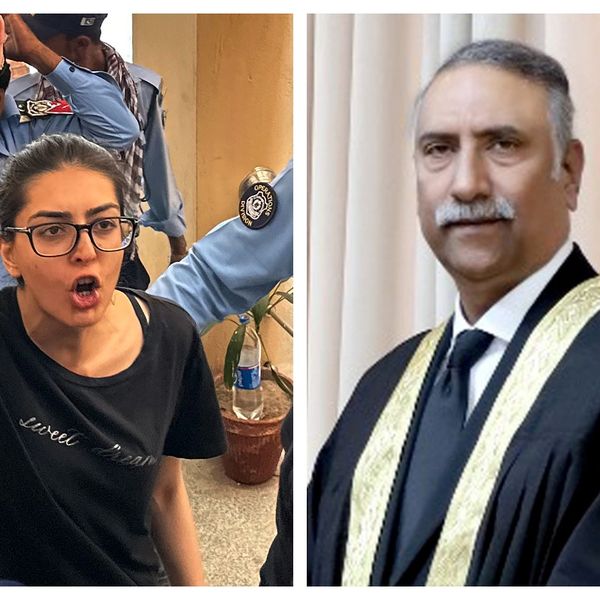Pakistan’s top court judge objects to committee removal, skips defection law review hearing
CJP Isa defers hearing of case till tomorrow, urges Justice Munib Akhtar to join bench
News Desk
The News Desk provides timely and factual coverage of national and international events, with an emphasis on accuracy and clarity.

Justice Munib Akhtar.
Courtesy: Supreme Court of Pakistan
Justice Isa tells Justice Akhtar, new judge to replace him on bench if he continues to miss hearings
The case centers on a May 17, 2022, ruling on a presidential reference concerning defection of lawmakers
A judge of Pakistan’s Supreme Court declined to join the five-member bench hearing a review petition regarding Article 63A of the Constitution, which addresses the status of defecting lawmakers.
Justice Munib Akhtar’s refusal led to the case being postponed by a day. Chief Justice of Pakistan (CJP) Qazi Faez Isa requested Akhtar’s involvement in the ongoing proceedings. This development comes amid reports of a growing divide among the top court judges.
The case centers on the court’s May 17, 2022 ruling on a presidential reference concerning Article 63A, which stated that votes cast by defecting lawmakers against party policy would not be counted. Former president Dr Arif Alvi filed the reference during the tenure of jailed ex-prime minister Imran Khan's government.
The judgment also left the duration of disqualification up to the discretion of parliament. This 3-2 verdict, led by then-Chief Justice Umar Ata Bandial, saw Justices Mazhar Alam Miankhel and Jamal Khan Mandokhail dissenting.
Justice Akhtar authored the majority opinion, which has since been challenged by multiple review petitions that remain unresolved.
During Monday’s proceedings, CJP Isa disclosed that Justice Akhtar had sent a letter explaining his decision not to join the bench, citing objections to the committee that constituted it.
“I am not recusing myself from hearing the case but cannot be part of this particular bench,” Akhtar stated in his letter, which CJP Isa read aloud in court.
Akhtar clarified that his refusal stemmed from concerns about the formation of the bench, not the substance of the case itself. His decision led the CJP to adjourn the hearing until tomorrow.
“We will request Justice Munib Akhtar to sit on the bench,” CJP Isa said, calling for cooperation to resolve the matter. “If he does not join, we will convene a meeting tomorrow and may consider including another judge.”
The case
The review petition concerns Article 63A of the Constitution, which outlines the disqualification process for members of parliament who defect from their parties.
The case has attracted significant attention due to its potential impact on political defections and party leadership powers in Pakistan’s parliamentary system.
It gained prominence after several PTI lawmakers defected to the opposition to vote for the ouster of party founder and then Prime Minister Imran Khan.
Article 63A
Article 63A of Pakistan’s constitution stipulates that a parliamentarian can be disqualified for defection if they vote or abstain from voting contrary to party directives in relation to the election of the prime minister or chief minister, a vote of confidence or no-confidence, a money bill, or a constitutional amendment.
The party leader must declare the lawmaker’s defection in writing, but before making such a declaration, the lawmaker must be given an opportunity to explain why they should not be disqualified.
If the party leader proceeds, the declaration is forwarded to the speaker of the house, who in turn forwards it to the chief election commissioner (CEC). The CEC has 30 days to confirm the declaration. Once confirmed, the member is disqualified, and their seat becomes vacant.
'Ruling might not be implemented'
Barrister Ali Zafar talks to Nukta about review petition regarding Article 63A of Pakistan's ConstitutionNukta
According to the legal procedure, PTI’s Barrister Ali Zafar, in conversation with Nukta, said that a three-member committee, including the Chief Justice of Pakistan (CJP), a senior-most Supreme Court judge, and a third member chosen by the CJP, is responsible for forming the bench.
“The participation of all three members is mandatory; only when they sit together can the bench be properly constituted. However, in this case, Justice Mansoor Ali Shah was absent from the committee that formed the commission. Instead of three, only two members— the CJP and Justice Aminuddin—were involved in the decision-making process. This raises questions about the credibility of the bench,” he added.
Zafar said that the law states that if there is a question over the lawfulness of a bench, its decisions may not be implemented. Therefore, he added, until it is determined who should form the bench, it remains unlawful, and its rulings might not be implemented.










Comments
See what people are discussing